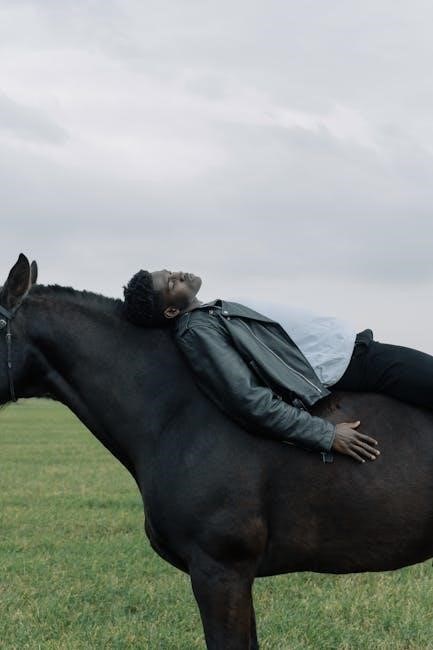
Eddie Jaku’s memoir, The Happiest Man on Earth, is a powerful exploration of resilience, hope, and joy․ Despite enduring unimaginable horrors during the Holocaust, Eddie shares his journey from trauma to happiness, emphasizing gratitude, tolerance, and kindness․ This inspiring book, available as a PDF, offers a heartfelt reflection on finding light in darkness and living a fulfilling life․
Who is Eddie Jaku?
Eddie Jaku, a Holocaust survivor and Auschwitz prisoner, is the author of The Happiest Man on Earth․ Born into a Jewish family, he endured unimaginable suffering during World War II․ Despite the trauma, Eddie embraced life with gratitude, kindness, and tolerance․ At 100 years old, he shared his remarkable story, inspiring millions with his philosophy of happiness․ His memoir, published in 2020, reflects his journey from darkness to light, offering timeless wisdom for modern readers․
The Significance of the Title
The title reflects Eddie Jaku’s extraordinary philosophy: despite surviving the Holocaust, he embraced life with gratitude, declaring himself the happiest man on earth․ The title symbolizes his choice to find joy amidst suffering, emphasizing hope and resilience․ It captures his belief that happiness is a mindset, born from kindness, tolerance, and appreciation for life’s beauty, even in darkness․ This profound message resonates universally, inspiring readers to reevaluate their own approach to life’s challenges․
Overview of the Book’s Content
The Happiest Man on Earth chronicles Eddie Jaku’s harrowing Holocaust experiences and his remarkable journey toward happiness․ The book details his survival in Auschwitz, his strategies for enduring unimaginable hardship, and his post-war life․ Eddie shares lessons on gratitude, tolerance, and kindness, offering a blueprint for finding joy even in adversity․ With heartfelt reflections and practical wisdom, this memoir inspires readers to embrace life’s beauty and cherish its precious moments, no matter the challenges faced․
Eddie Jaku’s Early Life and Historical Context
Eddie Jaku, a young Jewish boy in Nazi Germany, faced rising antisemitism and violence, culminating in Kristallnacht, which shattered his family’s peaceful life and led to his arrest․
Childhood and Family Background
Eddie Jaku was born into a loving Jewish family in Germany, where his parents, Isidor and Hilda, instilled in him values of kindness, gratitude, and resilience․ Growing up in a vibrant community, Eddie experienced a nurturing childhood that shaped his optimistic outlook․ Despite rising antisemitism, his family’s warmth and support created a foundation of strength, preparing him to face the challenges that lay ahead․ His early life was marked by love, learning, and a deep connection to his heritage․
The Impact of Kristallnacht
Kristallnacht, the Night of Broken Glass, marked a devastating turning point in Eddie Jaku’s life․ On November 9, 1938, he was brutally beaten by SS officers, arrested, and sent to a concentration camp․ This violent event shattered his family’s security and thrust him into the horrors of the Holocaust․ The trauma of Kristallnacht became the beginning of Eddie’s unimaginable suffering, shaping his journey through darkness and ultimately influencing his determination to find happiness and hope in the face of adversity․
Survival in Concentration Camps
Eddie Jaku endured unimaginable horrors in Auschwitz and other camps, facing forced labor, starvation, and brutality․ His resilience and determination to survive fueled his journey through darkness․
Life in Auschwitz and Other Camps
Eddie Jaku’s experiences in Auschwitz and other concentration camps were marked by immense suffering․ He faced brutal conditions, forced labor, and constant fear․ Despite the horrors, Eddie’s resilience and ability to find hope in small acts of kindness helped him survive․ His memoir vividly captures the harsh realities of camp life, while also highlighting the strength of the human spirit in overcoming unimaginable adversity․
Strategies for Survival
Eddie Jaku’s survival in concentration camps relied on mental strength, hope, and resilience․ He focused on gratitude, finding positivity in small acts of kindness, and maintaining dignity․ By setting daily goals and fostering inner peace, Eddie coped with the unbearable conditions․ His ability to adapt and stay optimistic became his greatest tools for enduring the horrors of Auschwitz and other camps, ultimately shaping his philosophy of happiness․

From Trauma to Happiness
Eddie Jaku’s journey from Holocaust trauma to profound happiness is a testament to resilience․ He found joy through gratitude, kindness, and a commitment to living a meaningful life․
How Eddie Found Happiness After the Holocaust
Eddie Jaku discovered happiness by embracing gratitude, tolerance, and kindness․ After the Holocaust, he vowed to honor the six million murdered Jews by smiling daily․ Despite unimaginable trauma, Eddie chose joy, believing life’s beauty lies in its preciousness․ His philosophy centers on finding light in darkness, fostering hope, and living a meaningful life․ Through resilience and positivity, Eddie transformed his pain into a testament of human strength and the power of happiness․
The Role of Gratitude and Kindness
Eddie Jaku’s philosophy centers on gratitude and kindness as essential pillars of happiness․ He emphasizes the importance of appreciating life’s small joys and spreading compassion․ After the Holocaust, Eddie vowed to honor the lives lost by living gratefully and fostering kindness․ His belief in these values transformed his trauma into a powerful message of hope, inspiring others to embrace positivity and humanity in their own lives, regardless of challenges․

The Book’s Structure and Key Themes
The Happiest Man on Earth is structured into chapters reflecting Eddie Jaku’s life lessons, with titles like “There Are Many Things More Precious Than Money․” Central themes include gratitude, tolerance, and hope, weaving together his Holocaust experiences with timeless wisdom for modern readers․
Chapter Highlights
The chapters of The Happiest Man on Earth capture Eddie Jaku’s journey, from surviving Auschwitz to embracing life’s beauty․ Titles like “There Are Many Things More Precious Than Money” and “Weakness Can Be Turned Into Hatred” reflect his wisdom․ Each chapter shares poignant lessons, emphasizing gratitude, kindness, and hope․ Through personal anecdotes, Eddie illustrates how he transformed trauma into joy, offering readers a blueprint for living a meaningful and fulfilling life amidst adversity․
Central Messages: Gratitude, Tolerance, and Hope
Eddie Jaku’s memoir underscores the transformative power of gratitude, tolerance, and hope․ He emphasizes gratitude as a daily practice, tolerance as a lesson from his Holocaust experiences, and hope as a catalyst for overcoming adversity․ These themes are woven throughout his story, offering readers a profound guide to embracing life’s challenges with resilience and positivity․ His philosophy inspires a mindset of appreciation and compassion, proving that happiness can emerge even in the darkest times․

Eddie Jaku’s Philosophy of Happiness
Eddie Jaku’s philosophy of happiness centers on gratitude, tolerance, and hope․ He believes in the power of positive thinking and kindness, promising to smile daily in thanks for life, inspiring others to find joy in their own journeys․
The Power of Positive Thinking
Eddie Jaku’s philosophy underscores the transformative power of positive thinking․ Despite enduring the Holocaust, he cultivated happiness through gratitude, kindness, and hope․ Eddie believed in embracing life’s beauty, even in darkness, by focusing on the good in people and situations․ His promise to smile daily, honoring the six million Jews murdered, reflects his commitment to positivity․ This mindset not only sustained him but inspired others to find joy in their own lives, proving happiness is a choice․
Lessons for Modern Readers
Eddie Jaku’s story offers timeless lessons for modern readers, emphasizing the importance of gratitude, tolerance, and kindness․ His journey teaches us that happiness is a choice, even in adversity․ By sharing his experiences, Eddie inspires readers to appreciate life’s small joys, foster resilience, and cultivate a positive mindset․ His philosophy encourages us to reframe challenges and embrace hope, proving that true happiness comes from within․ These lessons remain universally relevant in today’s fast-paced and often stressful world․
Impact and Reception of the Book
The Happiest Man on Earth has received widespread acclaim for its heartfelt memoir and inspiring themes of hope and resilience․ The PDF version has been widely downloaded, resonating with readers globally for its emotional depth and uplifting message․
Reader Reviews and Testimonials
Readers worldwide have praised The Happiest Man on Earth for its emotional depth and inspiring message․ Many describe it as a life-changing memoir, highlighting Eddie’s resilience and optimism․ The PDF version has been widely shared, with readers appreciating its accessibility․ Testimonials often mention the book’s ability to instill hope and gratitude, even in difficult times․ Eddie’s story has left a profound impact, resonating deeply with those seeking inspiration and a reminder of humanity’s strength․ His legacy continues to inspire through this heartfelt memoir․
Media Coverage and Awards
The Happiest Man on Earth has garnered widespread media attention, with major outlets praising its heartfelt narrative․ The book has been featured in numerous bestseller lists and received critical acclaim for its emotional depth․ A documentary titled Billy Flanigan: Happiest Man on Earth further amplified its reach․ While specific awards aren’t listed, the memoir’s impact and popularity underscore its resonance with readers and critics alike, solidifying its place as a modern inspirational classic․

Practical Lessons from “The Happiest Man on Earth”
Eddie Jaku’s journey teaches us to embrace gratitude, kindness, and tolerance․ His story inspires readers to find joy in everyday moments and live a purposeful life․
Applying Eddie’s Wisdom to Daily Life
Eddie Jaku’s teachings offer practical lessons for everyday life․ His emphasis on gratitude, kindness, and tolerance encourages readers to appreciate small joys and foster positive relationships․ By embracing his philosophy, one can transform challenges into opportunities for growth․ Eddie’s resilience and optimism inspire individuals to cultivate happiness amidst life’s difficulties, making his wisdom a timeless guide for living a fulfilling and meaningful life․
Transformative Takeaways
Eddie Jaku’s story offers profound lessons on transforming suffering into strength․ His memoir highlights the power of gratitude, kindness, and hope in overcoming adversity․ Readers gain insights into fostering resilience, embracing positivity, and finding purpose․ Eddie’s belief that happiness is a choice inspires readers to reframe challenges and cultivate joy․ These takeaways serve as a timeless guide for living a meaningful life, reminding us that even in darkness, light and hope can prevail․
Eddie Jaku’s legacy is a testament to resilience and hope․ His story, shared in The Happiest Man on Earth, inspires us to embrace gratitude, kindness, and positivity, proving that happiness is a choice, even in the darkest times․
The Legacy of Eddie Jaku
Eddie Jaku’s legacy is one of resilience, hope, and inspiration․ A Holocaust survivor and Auschwitz prisoner, he transformed his traumatic experiences into a message of gratitude and kindness; His memoir, The Happiest Man on Earth, has touched hearts globally, showing that happiness is a choice․ Even after his passing in 2021, Eddie’s story continues to inspire, reminding us to embrace positivity and cherish life’s beauty, ensuring his wisdom endures for future generations․
The Timeless Relevance of His Story
Eddie Jaku’s story remains timeless, offering universal lessons on hope, kindness, and resilience․ His journey from Auschwitz to becoming the “happiest man on Earth” inspires readers to embrace gratitude and positivity․ In an age grappling with division and adversity, Eddie’s memoir serves as a powerful reminder of the human spirit’s capacity for love, tolerance, and happiness․ His legacy continues to resonate, encouraging future generations to cherish life’s beauty and seek joy even in darkness․
